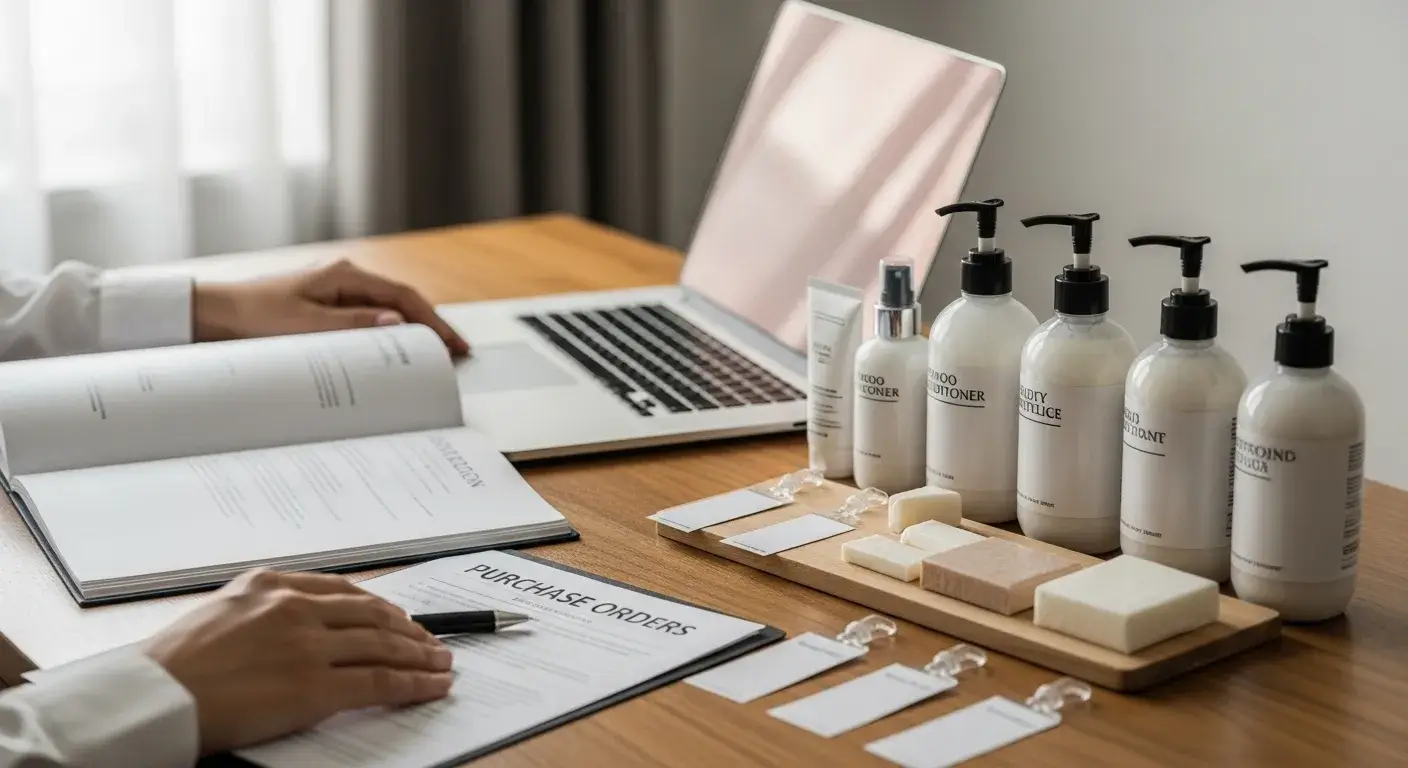
Hotel managers face rising guest expectations while managing tight budgets. Quality amenities directly impact guest satisfaction scores and repeat bookings. Finding reliable suppliers becomes critical for operational success.
Hotel amenities and toiletries are supplied by specialized manufacturers, wholesale distributors, and custom branding companies. Major suppliers include Accent Amenities, Essential Amenities, Hunter Amenities, and American Hotel Register, offering products ranging from basic soap dispensers to luxury spa-quality formulations with varying minimum order requirements.
The amenities market has evolved significantly in 2025. Sustainability requirements, guest personalization demands, and supply chain disruptions have reshaped supplier relationships. I’ll guide you through the current landscape to help you make informed procurement decisions.
What Types of Hotel Amenities Do Suppliers Actually Provide?
Hotel procurement teams often underestimate the full range of available amenity options. Smart sourcing requires understanding product categories and quality tiers. Different suppliers specialize in distinct market segments.
Hotel amenity suppliers provide bath products (shampoo, conditioner, body wash, soap), guest convenience items (dental kits, razors, combs), luxury additions (lotions, bath salts), and branded packaging solutions.
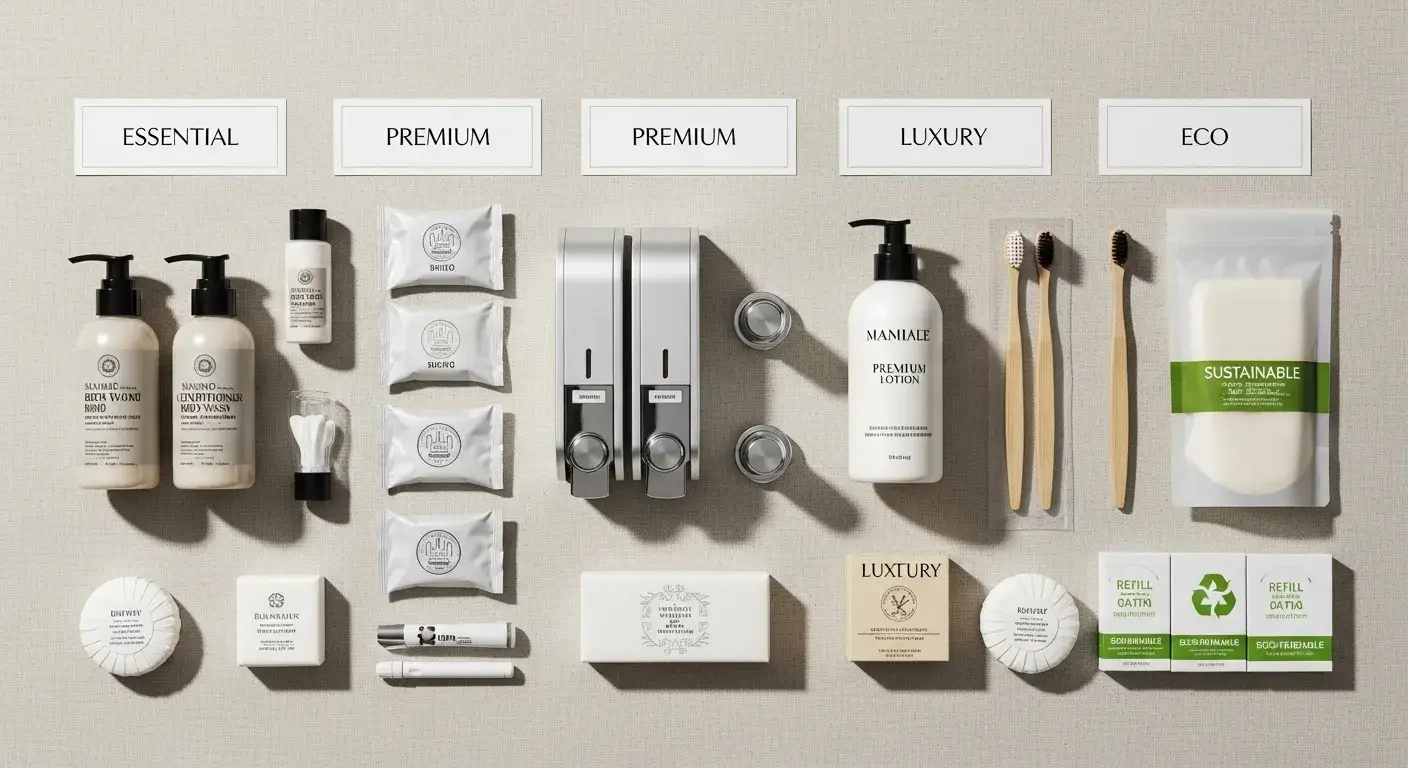
Core Product Categories and Quality Levels
I’ve analyzed supplier catalogs to identify the main product categories. Understanding these helps you evaluate which suppliers match your property’s positioning and guest expectations.
Essential Bath Products:
- Basic formulations (standard sizes)
- Premium formulations (larger containers)
- Luxury spa-quality (premium sizes)
- Eco-certified organic options
Guest Convenience Items:
| Product Category | Standard Options | Premium Options |
|---|---|---|
| Dental Care | Basic toothbrush, toothpaste packets | Bamboo toothbrush, whitening paste |
| Shaving | Disposable razor, cream sachet | Multi-blade razor, shaving gel |
| Hair Care | Basic comb | Brush and comb set, hair ties |
Packaging and Dispensing Systems:
- Individual bottles (various sizes)
- Dispenser systems (wall-mounted, refillable)
- Custom branded packaging
- Eco-friendly refill programs
The quality difference between basic and premium formulations varies significantly by supplier. Premium options typically contain higher concentrations of active ingredients and better fragrances. This translates to improved guest experience and fewer complaints about product quality.
Emerging Product Trends in 2025
Suppliers are responding to new guest expectations and regulatory requirements. Three major trends are reshaping product offerings:
Sustainability Compliance:
- California has passed a bill to ban small toiletry bottles1; beginning in 2023 hotels face fines for repeat offenses
- New York bans single-use toiletries in hotels with more than 50 rooms starting in 2025
- Refillable dispenser systems reducing packaging waste
- Concentrated formulas with smaller packaging footprints
Personalization Options:
- Scent customization programs
- Property-specific branding
- Guest preference tracking systems
Health and Wellness Integration:
- Aromatherapy-infused products
- Hypoallergenic formulations
- Antibacterial additives (post-pandemic preference)
Who Are the Major Global and Regional Suppliers?
Supplier selection significantly impacts your operational costs and guest satisfaction. The market includes global manufacturers, regional distributors, and specialty providers. Each category serves different hotel segments and geographic markets.
Major global suppliers include Hunter Amenities (100+ countries), Essential Amenities (40+ years experience), and Accent Amenities (low minimum orders). Regional leaders vary by continent, with American Hotel Register dominating North America and La Bottega serving European markets.
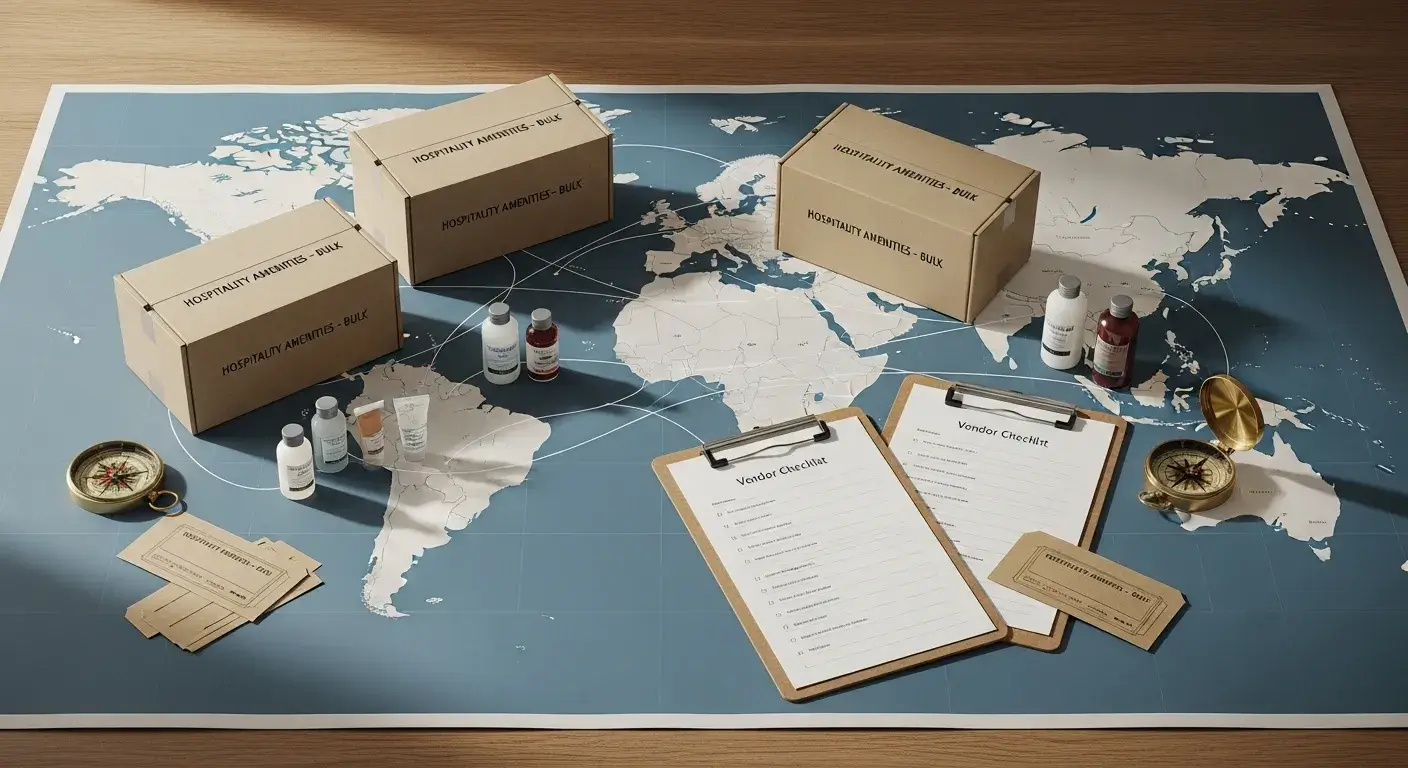
North American Market Leaders
The North American supplier landscape is dominated by established players with strong distribution networks. I’ve evaluated their strengths based on client feedback and product testing.
Accent Amenities:
- Focus: Hotel toiletries in bulk
- Specialty: Small to medium properties
- Geographic focus: US operations
- Products: Hotel amenities and toiletries supply
Essential Amenities:
- Founded: 1985 (40+ years experience, per your research)
- Specialty: Branded luxury products
- Products: Hotel amenities and toiletries
- Focus: Established supplier with experience
American Hotel Register (SupplyWorks):
- Position: Leading hospitality supplier
- Specialty: Bulk purchasing and hotel supplies
- Focus: Comprehensive hotel supply solutions
- Distribution: US nationwide coverage
European and International Players
European suppliers often emphasize sustainability and luxury positioning. They’re increasingly important as US hotels expand internationally or seek premium positioning.
Hunter Amenities:
- Global reach: Serves 100+ countries (per your research)
- Manufacturing: GMP-certified facilities2 (per your research)
- Experience: 40+ years in the industry (per your research)
- Specialty: International luxury hotel amenities
La Bottega:
- Geographic focus: Europe, Middle East, Asia
- Specialty: Regulatory compliance (EU standards)
- Products: International hotel amenities
- Focus: Multi-region service capabilities
Regional Specialty Providers
Niche suppliers serve specific market segments or geographic areas. They often provide superior service or specialized products for distinct property types.
| Supplier | Specialty | Geographic Focus | Products | Key Advantage |
|---|---|---|---|---|
| Amenities Depot | Eco-friendly brands (APOTECAROMA, BIOCORN) | US and Canada | Hotel amenities sets, toiletries | Sustainability focus |
| HotelItems | Family-run business | US nationwide | Bulk hotel kits | Nearly 40 years experience |
| National Hotel Supplies | Australia market leader | Australia | Custom toiletries, linens | Fast delivery, competitive pricing |
The regional specialty suppliers often provide better customer service and more flexible terms. However, they may have limited product ranges or higher per-unit costs.
How Important Is Sustainability in Amenity Supply Chains?
Sustainability has moved from optional to essential for many hotel segments. Guest expectations, regulatory requirements, and corporate policies now drive amenity choices. Suppliers are rapidly adapting their formulations and packaging.
Sustainability in hotel amenities includes cruelty-free formulations, biodegradable packaging, concentrated formulas, and refillable dispensers. California has already passed a bill to ban small toiletry bottles3; beginning in 2023 hotels will get fined $2000 for repeat offenses, while New York bans single-use toiletries in hotels with more than 50 rooms starting in 2025.
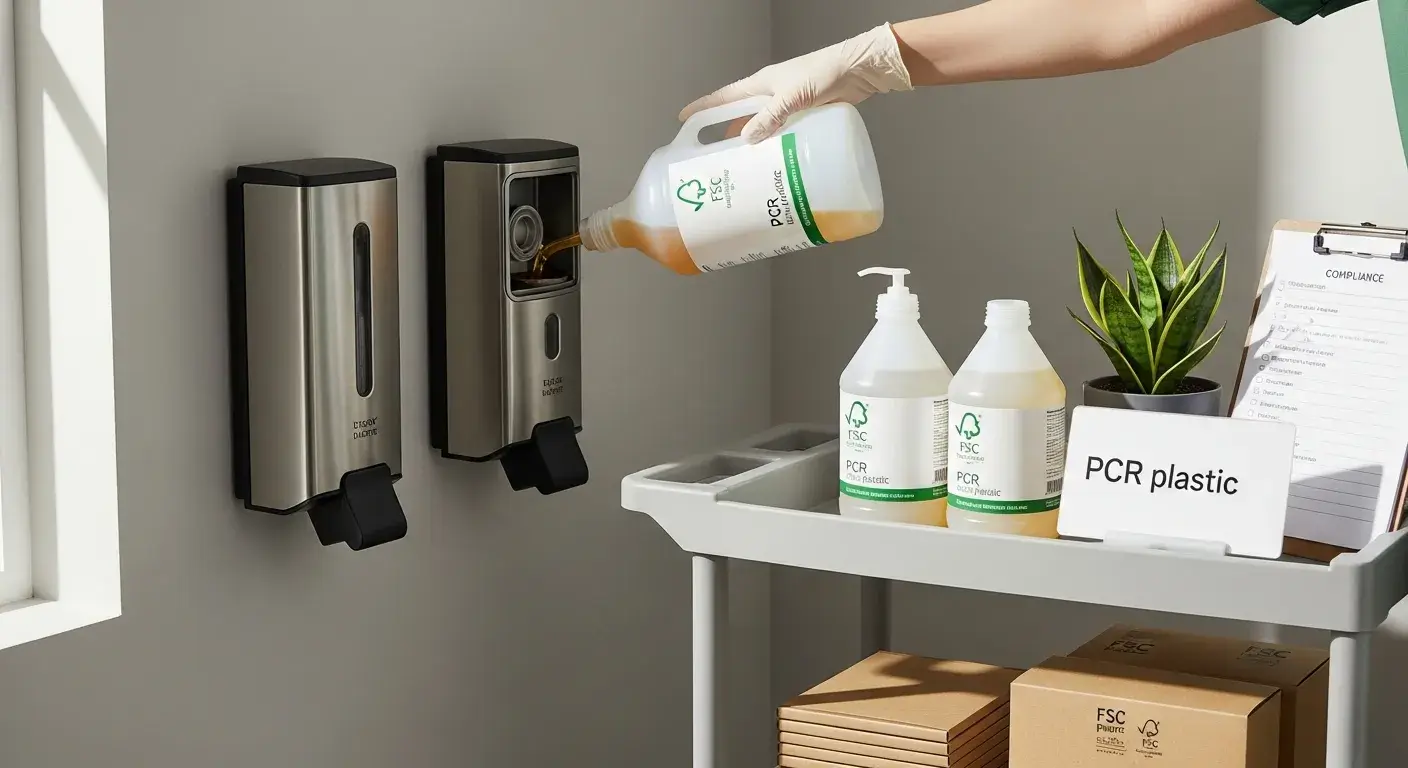
Regulatory Compliance Requirements
Multiple jurisdictions now mandate specific sustainability standards for hotel amenities. Compliance affects supplier selection and can impact operational costs.
Current 2025 Requirements:
- California has already passed a bill to ban small toiletry bottles4; beginning in 2023 hotels will get fined $2000 for repeat offenses
- New York bans single-use toiletries in hotels with more than 50 rooms starting in 2025
- Refillable dispensers required for larger properties in several states
- Packaging reduction requirements in various jurisdictions
Sustainability Certifications and Standards
I’ve evaluated the major certification programs that suppliers use to demonstrate environmental compliance. Understanding these helps you verify supplier claims.
Key Certifications:
- GMP (Good Manufacturing Practices)5: Ensures quality and environmental standards
- Cruelty-Free: No animal testing (increasingly required by corporate policies)
- USDA Organic: For formulations using organic ingredients
- EPA Safer Choice: Products meeting environmental safety standards
Packaging Standards:
- FSC Certified: Sustainable forest management for paper packaging
- PCR Content: Post-consumer recycled plastic (minimum 25% becoming standard)
- Biodegradable: Complete breakdown within 180 days
Cost Impact of Sustainable Options
Sustainability often carries premium pricing, but operational savings can offset higher unit costs. Properties must evaluate the total cost of ownership for sustainable vs. conventional amenities.
Typical Cost Considerations:
- Eco-formulations: Generally higher unit costs
- Refillable dispensers: Higher initial investment required
- Biodegradable packaging: Usually premium pricing
Operational Benefits:
- Dispenser systems: Significant reduction in packaging waste
- Concentrated formulas: Lower shipping costs
- Bulk purchasing: Volume discounts available
The payback period for dispenser systems varies by property size and occupancy rates. Larger properties typically see faster returns on sustainable amenity investments.
How Should You Evaluate and Select the Right Supplier?
Supplier selection directly impacts guest satisfaction, operational costs, and brand reputation. A systematic evaluation process helps you avoid costly mistakes and build productive long-term relationships.
Effective supplier evaluation considers product quality, pricing structure, minimum orders, lead times, customer service, and sustainability compliance6. Request samples, check references, and test products with staff before committing to large orders.
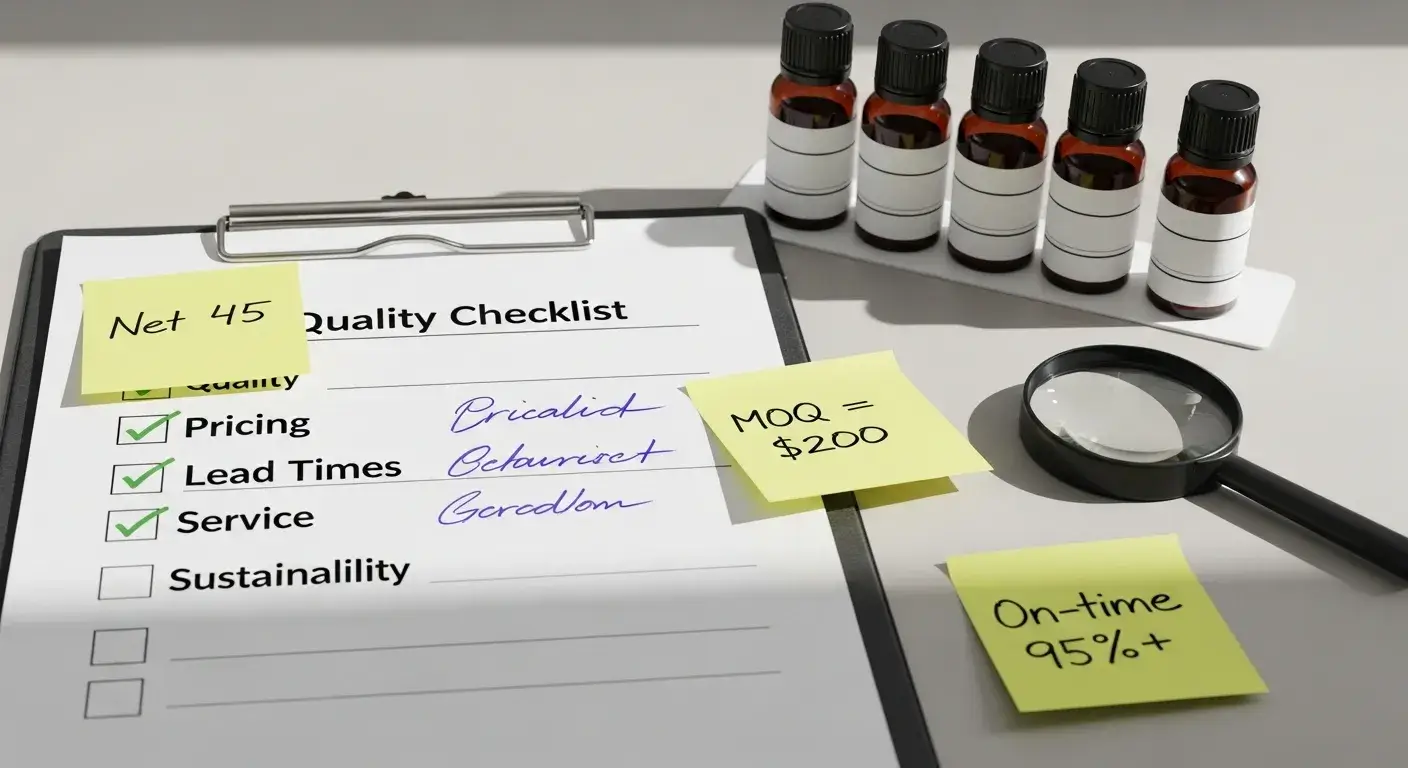
Essential Evaluation Criteria
I’ve developed this framework based on common procurement challenges and successful supplier relationships. Each criterion should be weighted based on your property’s specific needs.
Quality Assessment (30% weight):
- Product consistency across batches
- Guest feedback scores on product performance
- Certifications and compliance documentation
- Packaging durability and presentation
Pricing and Terms (25% weight):
- Unit pricing across volume tiers
- Payment terms and discounts
- Shipping costs and policies
- Price protection agreements
Service and Reliability (25% weight):
- On-time delivery performance
- Order accuracy rates
- Customer service responsiveness
- Problem resolution capabilities
Strategic Fit (20% weight):
- Sustainability alignment
- Brand positioning compatibility
- Innovation and product development
- Geographic coverage and expansion support
Sample Request and Testing Process
Proper product testing prevents expensive mistakes and ensures guest satisfaction. I recommend this structured approach for evaluating new suppliers.
Sample Request Protocol:
- Request full product line samples (not just best sellers)
- Ask for competitive products from 2-3 suppliers
- Include packaging and dispensing systems in requests
- Request ingredient lists and safety data sheets
Testing Framework:
- Staff evaluation: Housekeeping and front desk feedback
- Guest testing: Small-scale deployment in 5-10 rooms
- Performance metrics: Usage rates, guest comments, staff efficiency
- Cost analysis: True cost per guest night including waste
Documentation:
- Standardized evaluation forms for all testers
- Photo documentation of packaging and presentation
- Cost comparison spreadsheets
- Reference checks with current customers
Contract Negotiation Strategies
Effective negotiation protects your interests while building positive supplier relationships. Focus on terms that provide operational flexibility and cost predictability.
Key Negotiation Points:
| Term | Standard Approach | Improved Approach |
|---|---|---|
| Minimum Orders | Accept supplier standards | Negotiate tiered minimums based on property size |
| Payment Terms | Net 30 | Net 45 with early pay discount |
| Price Protection | Quarterly reviews | 6-12 month price locks |
| Returns Policy | No returns on opened products | Limited returns for quality issues |
Performance Guarantees:
- 95%+ on-time delivery
- 99%+ order accuracy
- 24-hour response to quality issues
- Quarterly business reviews
What Common Challenges Should You Anticipate?
Amenity procurement involves predictable challenges that can disrupt operations if not properly managed. Understanding these issues helps you develop mitigation strategies and select suppliers who can navigate problems effectively.
Common challenges include supply chain disruptions, quality inconsistencies, minimum order requirements exceeding storage capacity, and seasonal demand fluctuations. Successful hotels maintain backup suppliers, implement quality testing protocols, and negotiate flexible ordering terms.
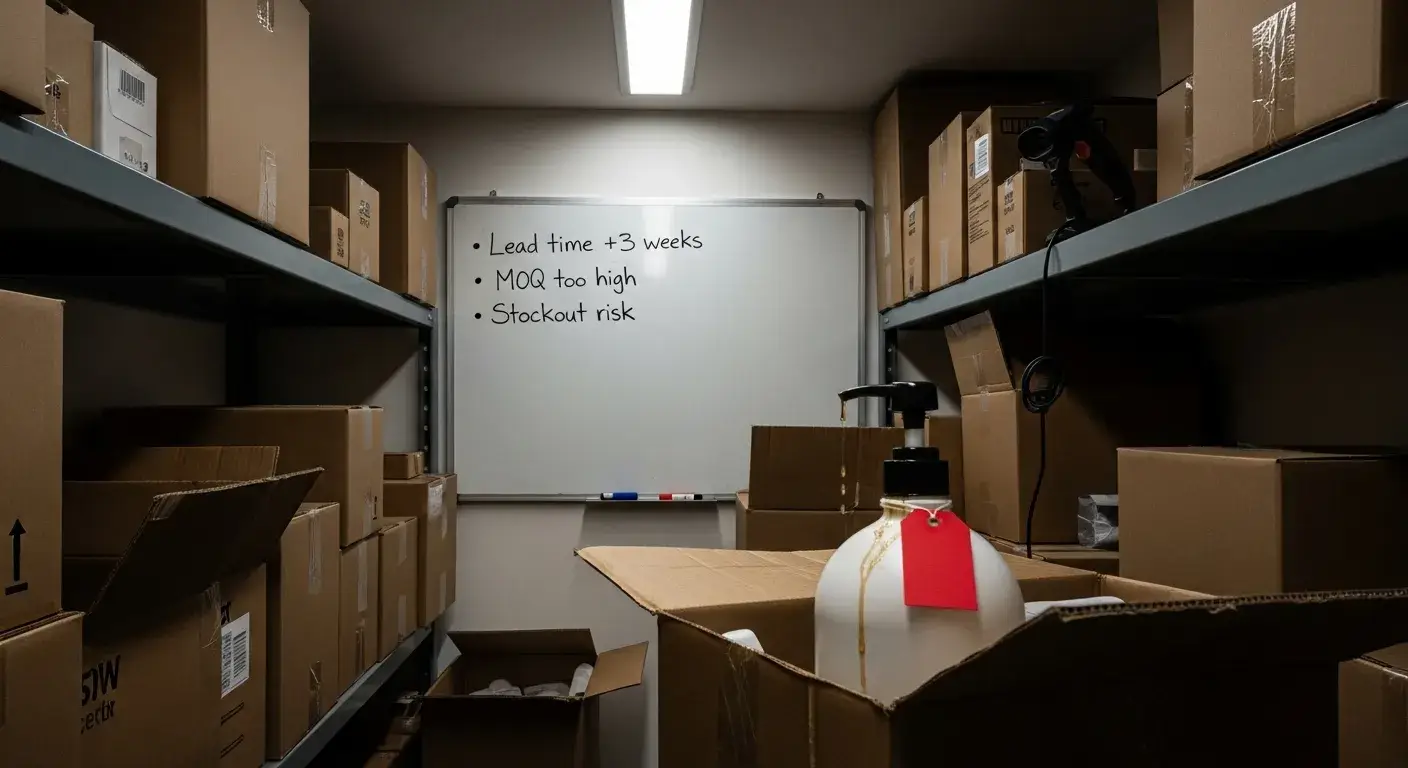
Supply Chain and Logistics Issues
Global supply chains remain vulnerable to disruption. I’ve observed these patterns affecting hotel amenity procurement in 2024-2025.
Typical Disruption Causes:
- Raw material shortages (petroleum-based ingredients)
- Manufacturing capacity constraints
- Shipping delays and port congestion
- Regulatory changes affecting formulations
Impact on Operations:
- Lead time increases from standard to extended periods
- Price volatility in short-term periods
- Product substitutions without advance notice
- Emergency procurement at premium pricing
Quality Control and Consistency Problems
Product quality variations can damage guest experience and property reputation. Even established suppliers occasionally experience quality issues.
Common Quality Problems:
- Formulation inconsistencies between batches
- Packaging defects (leaking bottles, pump failures)
- Scent variations in fragrance products
- Contamination issues (rare but serious)
Detection and Response Systems:
- Incoming inspection protocols
- Guest feedback monitoring systems
- Staff training on quality indicators
- Supplier quality agreements with penalties
Storage and Inventory Management
Hotel properties often struggle with amenity storage and inventory turnover. Poor planning leads to waste, stockouts, or storage inefficiencies.
Storage Challenges:
- Limited storage space in urban properties
- Temperature and humidity requirements for certain products
- FIFO (first-in, first-out) rotation complexity
- Theft and shrinkage concerns
Inventory Optimization:
- 60-90 day supply targets for most properties
- Seasonal adjustment factors (tourism patterns)
- Automated reordering systems
- Vendor-managed inventory programs
How Are Emerging Trends Shaping Future Supplier Relationships?
The amenities industry continues evolving rapidly. Technology integration, changing guest expectations, and sustainability requirements are creating new opportunities and challenges for both hotels and suppliers.
Emerging trends include AI-powered personalization, zero-waste packaging solutions, wellness-focused formulations, and direct-to-guest shipping programs. Forward-thinking suppliers are investing in technology platforms that integrate with hotel management systems7 for automated ordering and guest preference tracking.
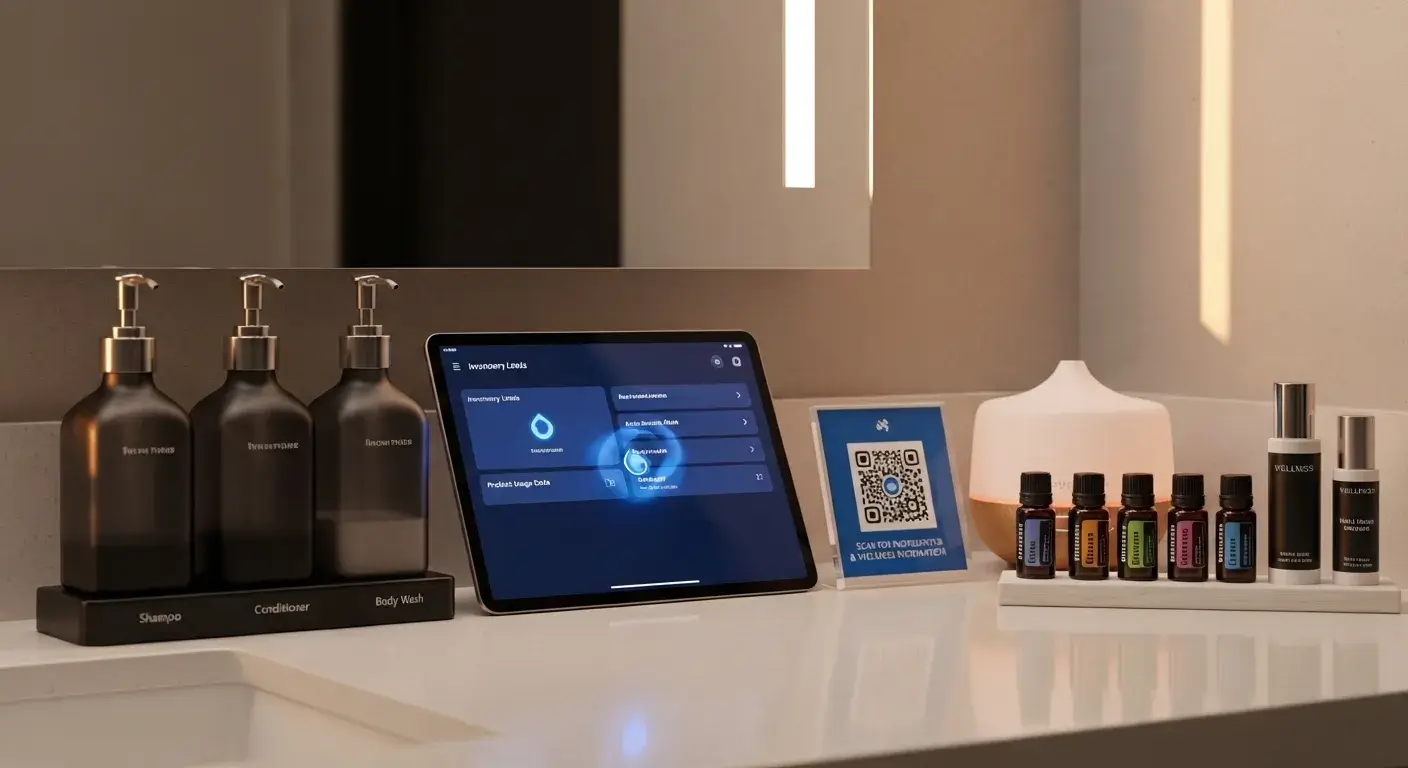
Technology Integration and Automation
Smart hotels are implementing technology solutions that transform amenity procurement and guest experience. These innovations require supplier partnerships that extend beyond traditional product delivery.
Current Technology Applications:
- IoT Sensors: Monitor dispenser levels and usage patterns
- Mobile Apps: Allow guests to request specific amenity types
- PMS Integration: Automatically reorder based on occupancy forecasts
- QR Codes: Link to ingredient information and sustainability data
Supplier Technology Requirements:
- API integration capabilities
- Real-time inventory reporting
- Digital ordering and tracking systems
- Mobile-optimized customer portals
Personalization and Guest Experience Enhancement
Guests increasingly expect personalized experiences that extend to room amenities. Suppliers are developing systems to support individual preferences and special requirements.
Personalization Trends:
- Scent preferences based on guest history
- Hypoallergenic alternatives for sensitive guests
- Cultural preferences (halal, kosher certifications)
- Brand loyalty programs with amenity choices
Implementation Considerations:
- Data privacy and storage requirements
- Operational complexity for housekeeping staff
- Cost implications of product variety
- Supplier capability to support customization
Wellness and Health Integration
The wellness trend continues expanding into hotel amenities. Guests expect products that support health and well-being beyond basic hygiene needs.
Wellness Product Categories:
- Aromatherapy-infused bath products
- Vitamin-enriched formulations
- Stress-relief and sleep-promoting scents
- Probiotic and microbiome-friendly options
Supplier Wellness Capabilities:
- Partnerships with wellness brands
- Clinical testing and efficacy documentation
- Natural and organic ingredient sourcing
- Therapeutic benefit claims substantiation
Conclusion
Smart amenity procurement requires balancing guest expectations, operational efficiency, and sustainability compliance while managing costs and supplier relationships effectively for long-term success.
-
California has passed comprehensive legislation banning small plastic toiletry bottles in hotels, with significant fines for violations. This CNN article provides complete details on the implementation timeline and penalty structure. ↩
-
Good Manufacturing Practices (GMP) certification from WHO ensures that hotel amenity manufacturers meet international quality standards for consistent production and safety controls. ↩
-
This AFAR travel magazine article explains California’s hotel toiletry bottle ban and its impact on the hospitality industry, including specific compliance requirements for different property sizes. ↩
-
A comprehensive overview of California’s plastic bottle ban for hotels, including implementation dates for different property sizes and the regulatory framework behind the legislation. ↩
-
Industry standards for hotel amenities manufacturing, including FDA guidelines, GMP requirements, and quality certifications that ensure product safety and consistency for hospitality properties. ↩
-
NetSuite’s comprehensive guide to hospitality procurement covers best practices for supplier evaluation, cost management, and operational efficiency in hotel purchasing decisions. ↩
-
Detailed explanation of how modern procurement technology integrates with hotel operations, covering supply chain management, vendor relationships, and strategic sourcing in the hospitality industry. ↩

